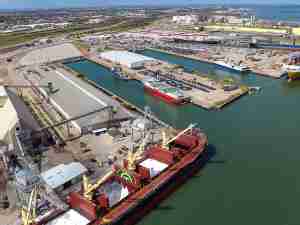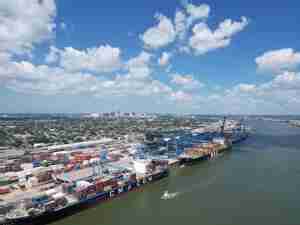For Jaafar and many other Iraqis, the long-delayed Grand Faw port project near the southern oil hub of Basra risks being killed off by a rival megaport already being constructed across the water by neighbouring Kuwait.
The Gulf ports dispute is straining ties because Baghdad fears Kuwait's Mubarak port not only threatens competition that will crowd it out of trade from Europe and the Middle East but may also infringe on Iraqi territory, a charge Kuwait denies.
The neighbours share more than just a narrow sea lane access to the Gulf, but also a long, bitter history of disputes over oil, water and land rights where the region's two great rivers, the Tigris and the Euphrates, sweep into the sea.
"This port won't only cause Iraq losses, but it is killing us off and launching an economic war," Jaafar, a board member of the Iraqi Business Federation's Basra branch, said at the tent he has set up in the southern city in imitation of those used by Arab families to accept condolences during mourning rites.
Some residents of Basra, from where the bulk of Iraq's oil exports are shipped, last month staged a demonstration against the Kuwaiti port, carrying banners which read: "Don't block our sea lanes" and "No blocking of Iraq's ports".
The harbour quarrel has exacerbated sensitivities between Iraq and Kuwait which have ebbed and flowed since Saddam Hussein's 1990 invasion of his neighbour. Iraq's troops were expelled by a U.S.-led force, months after Saddam denounced the colonial-era border and declared Kuwait Iraq's 19th province.
"The issues are minimum in some ways, but they have taken on outsized proportions because of the principles and history they represent to the parties," said Ken Pollack, director for the Saban Center for Middle East Policy at the Brookings Institute.
Iraq has been planning for more than two decades to build a large new deep-water port on the Khawr Abd Allah waterway -- opposite Bubiyan island, where Kuwait is building its port.
Iraq's Grand Faw megaport scheme has been successively delayed largely because of the wars Iraq has lived through -- with Iran in the 1980s, the invasion of Kuwait in 1990 and the war and sectarian conflict that followed the 2003 U.S.-led invasion that toppled Saddam, who was hanged in 2006.
Iraq has only a sliver of coast, squeezed in between Iran and Kuwait. Umm Qasr, one of four Iraqi commercial ports but its only deep water one, handles 80 percent of Iraq's imports, including grain for a huge public food ration programme.
Umm Qasr is already one of the most expensive ports in the world for shippers, and importing firms complain of being asked for heavy bribes, of poor service and high handling costs.
"Mubarak port will block Umm Qasr port and cut the sole maritime artery that Iraq's ports rely on. It will close the naval maritime channel leading to Umm Qasr and deprive Iraq of its legitimate right," Captain Kadhim Finjan, a naval expert and a senior official at Iraq's state-run ports company, said.
UN Monitors Dispute
Kuwait denies this, saying it has assured its Iraqi neighbours that Mubarak does not encroach on Iraqi territory and will not hinder traffic in the shared, constricted waterway.
"Our port is not even in international waters, but is built on Kuwaiti territory, under Kuwaiti sovereignty and far from the navigation path that Iraqi ships use to get to Umm Qasr," the undersecretary of Kuwait's Foreign Ministry, Khaled al-Jarallah, told reporters recently in Jeddah, Saudi Arabia.
But many Iraqis, including former transport minister Amer Abdul Jabar, say the planned 14,000 ships-a-year handling capacity of the Kuwaiti megaport under construction will stifle business and traffic for the Iraqi ports, including Grand Faw.
He urged Iraq's government to respond by denying Kuwait permission to transfer goods by rail










